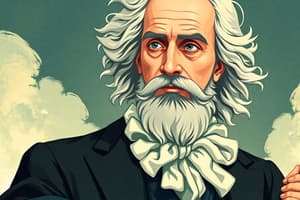Podcast
Questions and Answers
What concept does Adam Smith argue that society should exploit to increase the wealth of nations?
What concept does Adam Smith argue that society should exploit to increase the wealth of nations?
- Altruism
- Self-interest (correct)
- Collective ownership
- Government intervention
What is the main idea of Milton Friedman regarding the money supply?
What is the main idea of Milton Friedman regarding the money supply?
The national economy functions like an automobile, where higher money supply accelerates growth.
What is Alfred Marshall's law of demand?
What is Alfred Marshall's law of demand?
The greater the amount to be sold, the smaller must be the price.
What are the two types of checks described by Thomas Malthus?
What are the two types of checks described by Thomas Malthus?
What did John Stuart Mill propose regarding tax policy?
What did John Stuart Mill propose regarding tax policy?
John Maynard Keynes believed that mathematical precision in economics is essential.
John Maynard Keynes believed that mathematical precision in economics is essential.
Which economic idea is John Kenneth Galbraith known for?
Which economic idea is John Kenneth Galbraith known for?
What does Ricardo's Law of Comparative Advantage suggest?
What does Ricardo's Law of Comparative Advantage suggest?
According to Karl Marx, what is inevitable in a capitalist society?
According to Karl Marx, what is inevitable in a capitalist society?
What is one of Thorstein Veblen's key beliefs about consumer behavior?
What is one of Thorstein Veblen's key beliefs about consumer behavior?
Flashcards are hidden until you start studying
Study Notes
Adam Smith
- Authored "The Wealth of Nations" in 1776, advocating for self-interest as a driver of societal wealth.
- Introduced the concept of the "invisible hand" symbolizing the free market dynamics.
- Emphasized the benefits of division of labor on productivity.
- Supported free trade as essential for economic growth.
Milton Friedman
- Promoted monetarism, likening the economy to a vehicle with money supply as accelerator/brake.
- Established the concept of "velocity" of money, asserting its stability compared to Keynesian views.
- Proposed that increased money supply leads to proportional price increases in the short run, ignoring government spending's significance.
Alfred Marshall
- Introduced marginalism in economics, explaining gradual adaptations by businesses and consumers.
- Identified three time frames in economic reactions: demand fluctuations, short-run supply changes, and long-term adjustments by producers.
- Developed concepts of "marginal utility," the law of demand, and price elasticity, emphasizing the intersection of supply and demand.
Thomas Malthus
- Regarded as the first professional economist, he published views on population growth and food supply in 1766.
- Argued that population growth outpaces food supply, leading to societal decay.
- Differentiated between positive and preventative checks on population, such as war and famine versus birth control measures.
- His predictions on population trends were flawed due to oversight of economic factors such as immigration and technological advances.
John Stuart Mill
- Expanded on Jeremy Bentham’s utilitarianism, forming the Utilitarian Society.
- Criticized Bentham's approach for neglecting higher moral values like honor and dignity.
- Authored "Principles of Political Economy," advocating for progressive taxation and welfare reforms.
John Maynard Keynes
- Challenged classical economics, arguing that insufficient demand leads to economic downturns.
- Disputed Say's Law regarding the link between savings and investment.
- Developed the concept of the Keynesian multiplier, highlighting the cascading effects of spending changes.
- Criticized reliance on mathematical precision in economic theories as misleading.
John Kenneth Galbraith
- Critiqued consumer culture, asserting that advertisers create artificial desires, coining the term "dependence effect."
- Recognized Friedrich von Hayek’s views on the significance of genuine human desires beyond imposed wants.
David Ricardo
- Introduced the Law of Comparative Advantage in 1809, advocating for specialization based on opportunity cost.
- Emphasized the efficiency of free trade in maximizing goods consumption for households.
- Argued against protectionism, suggesting tariffs hinder economic growth except for specific cases like national defense.
Karl Marx
- Explored class struggle and revolution as integral to societal development in his "Communist Manifesto."
- Predicted capitalism's collapse due to inherent contradictions and class exploitation.
- Identified a sequence of economic decline culminating in the proletariat's misery.
- Criticized for offering no implementation strategy for his theories and overlooking the entrepreneurial value in labor.
Thorstein Veblen
- Contributed to institutional economics, emphasizing societal norms over traditional economic categories.
- Challenged the assumption that workers are motivated solely by monetary compensation.
- Introduced the concept of the "emulatory instinct," arguing consumer behavior is influenced by social perceptions of status purchases.
Studying That Suits You
Use AI to generate personalized quizzes and flashcards to suit your learning preferences.




